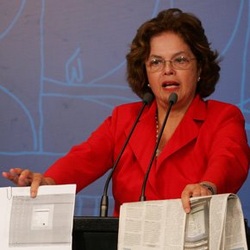 by Yoon Joung Lee Brazil’s new female president, Dilma Rousseff, was born in Belo Horizonte, Minas Gerais in 1947 to Bulgarian lawyer and entrepreneur Pedro Rousseff and school teacher Dilma Jane da Silca. Rousseff grew up in an upper middle class household. In her childhood, she lived in a large house with three servants. Rousseff and her two siblings, Igor and Zana Luica, were able to get a classical education including piano and French lessons. Her father died when she was 14 after leaving behind to her family about 15 properties. In 1965, she enrolled in the Central State High School where she became hugely interested in politics. During this time, in her late teens, she became involved in left-wing politics and joined the underground resistant groups to the military dictatorship. In 1967, she joined her first group called POLOP (Worker’s Politics), a faction of the Brazilian Socialist Party founded in 1961. The group divided into the method to be used for the implementation of socialism, and the support of the struggle for the election of a constituent assembly. She later joined a second group which originated the Command of National Liberation. This secretive radical group saw the necessity of taking up arms against an illegitimate military regime. She ended up in the clandestine VAR-Palmares which is Palmares Armed Revolutionary Vanguard. In the 1960s and 1970s, such groups seized foreign diplomats for hostages to exchange with political leaders. For instance, a US ambassador was exchanged with a dozen political prisoners while German and Swiss ambassadors were swapped for more than 40 militants. The members of such groups were also involved in the acts of shooting foreign torture experts who were sent to train the generals’ death squads. She had said that she was never actively involved in armed operations. However, in 1970 she was jailed in Sao Paulo for three years for “subversion” since she was armed when the undercover police found her at a bar. Her sentence was six years of imprisonment and 18 years without political rights, but it was later shortened. She was taken to the OBAN headquarters, and there she was tortured for 22 days with ferule, punching, and electric shock devices. In 1973 when she was freed, she moved to Rio Grande do Sul. There she went back to university and started working for the state government in 1975. In 1977, she graduated from the Rio Grande do Sul Federal University with a major in Economics. Her second husband Carlos Araujo was also finishing his four-year term as a political prisoner by the time. In the same year, she gave a birth to her only daughter, Paula Rousseff Araujo. Due to her subversive past, she lost her first job and returned to university for a master’s degree. However, she never finished the program. In the early 1980s, Rousseff and her husband, Araujo, became an active member in the PDT (Democratic Labour Party) led by Leonel Brizola. In the mid-1980s, the couple devoted themselves to help out Alceu Collares and his campaign for mayor of Porto Alegre, and Collares appointed Rousseff as a Municipal Secretary of Treasury after he was elected. In 1993, she was appointed the secretary of energy by the state governor of Rio Grande do Sul. However, she left the position the next year. In 1999, she was again appointed to her old job which was now called Secretary of Mines, Energy and Communications. In 2000, she divorced after found out that her husband had another woman who was pregnant with his child. In 2001, she joined the Workers’ Party, led by Luiz Inacio Lula da Silva, and left government in 2002 to work for Lula’s successful campaign for presidential elections. He was finally elected and appointed her Mines and Energy Minister. In 2005, when Lula’s chief of staff resigned due to a scandal, Rousseff was again appointed. In the beginning of 2009, she firstly ran for elected office with a lack of experience and little name recognition as a candidate. In 2010, she started her campaign as the official presidential candidate from the Worker’s Party in the 2010 presidential election. She won the Presidency by an approximate margin of 56% to 44 % and will become the female head of government for the first time in the Brazil’s history on January 1, 2011. During her campaign, she presented that she will continue and follow Lula’s path that consists of largely market-friendly policies and social welfare programs. Due to Lula’s huge popularity in Brazil, many expect that Rousseff will become as popular a president as Lula. Comments are closed.
|
Archives
July 2017
Categories
All
|
 RSS Feed
RSS Feed